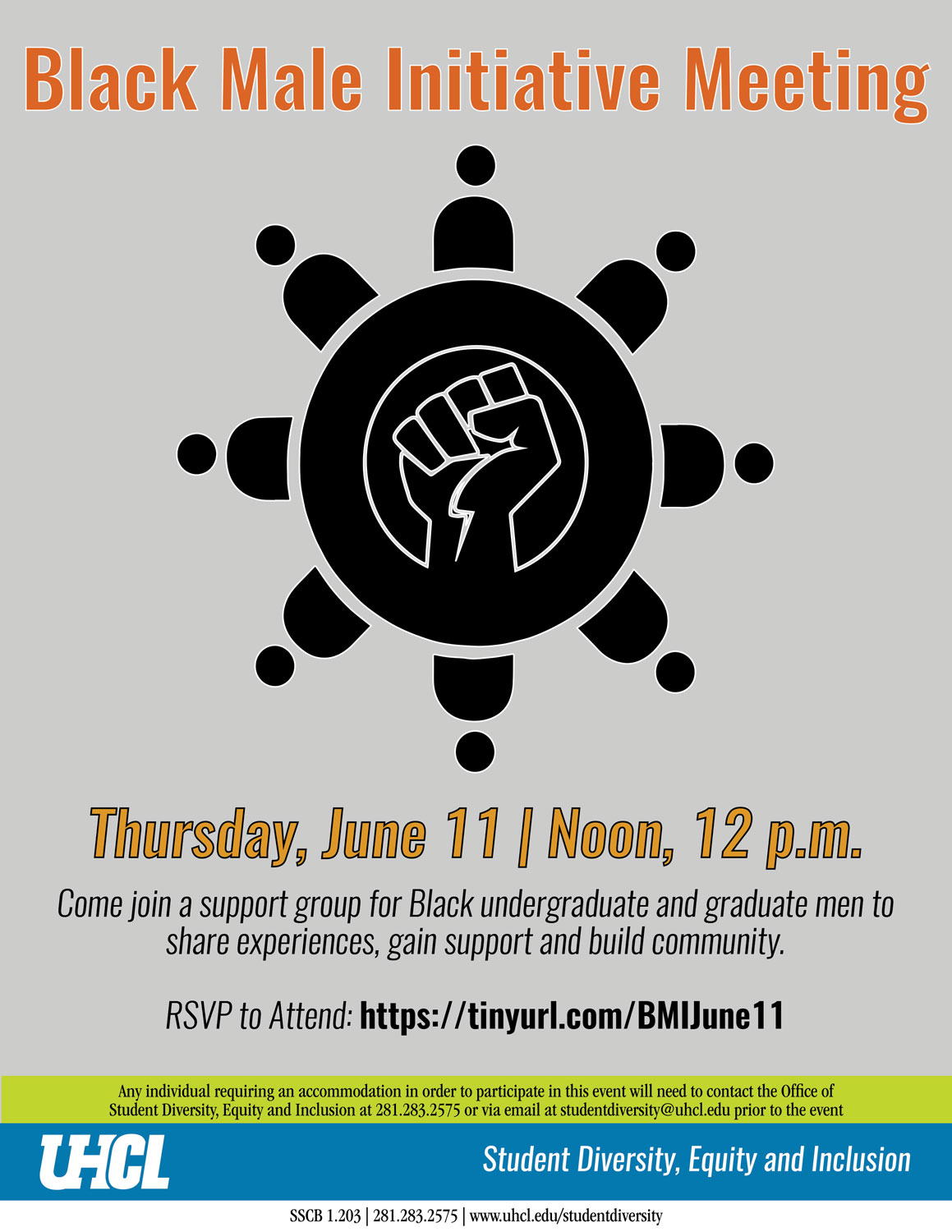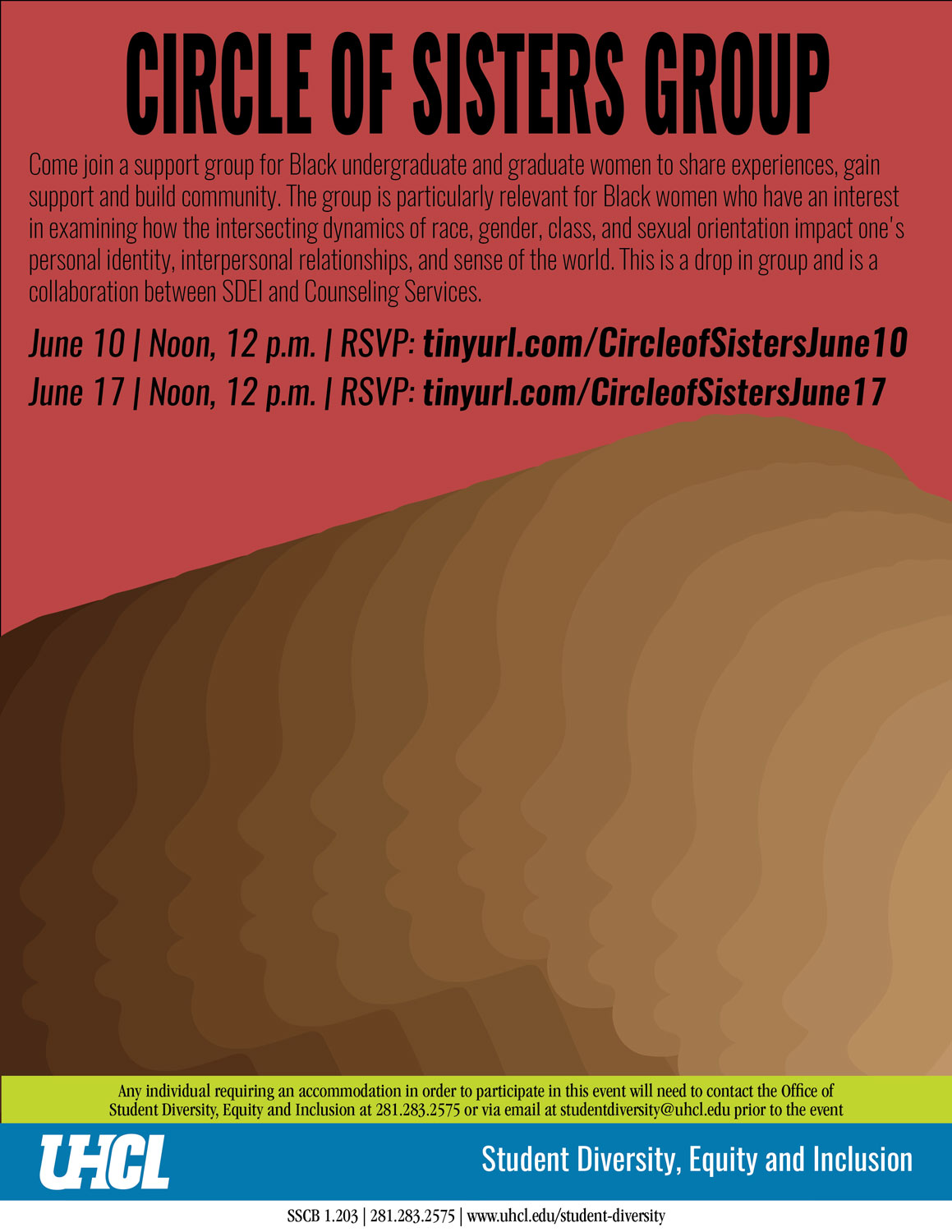
Black support groups meet online
With the recent killings of Black Americans like George Floyd, Breonna Taylor, Riah Milton, Arbery Ahmaud and others, the conversations around mental health and support for Black Americans are being revisited by the nation. Data from the Census Bureau shows the relationship between a spike in anxiety and depression spiked for Black Americans as the death of Floyd went viral.
The UHCL community reintroduced Black support groups “Circle of Sisters” and the “Black Male Roundtable” in an effort to address these concerns. Though both groups met for weeks at a time pre-COVID-19, these recent events have prompted the return.

“Black Male Roundtable Discussion”
A few semesters ago, a report was put together to address the concerns over recruitment and retention of Black male students. From this the “African American Male Initiative” (AAMI), a task force, was created, with one of their initiatives including the “Black Male Roundtable Discussion.”
Headed by Dorsey Thomas, director of the Student Assistance Center, and Brandon Byrd, admissions director, this support group is structured to have every meeting be an open discussion.
“A couple times a month we select current topics to discuss that Black males are interested in,” said Thomas. “We had a conversation last Thursday about the recent murder of an unarmed Black males, the statements of Donald Trump… Jake Fromm’s saying ‘only elite white people should have guns, so that is why guns should be made more expensive’ and the statement from Joe Brees that ‘he couldn’t understand why people don’t stand for the national anthem.’”
Thomas explained that attending a group like this gives Black men on campus a chance to network, converse and build community.
“We also have African students that can give a different perspective, we have students from Great Britain,” said Thomas. “A lot of us don’t think that racism exists across the pond, but they’re facing some of the same issues,” said Thomas. “We are talking [about issues] internationally, not just domestically.”
In addition to the discussions, this group is able to build community and make connections within UHCL.
“What they leave with is not always what you know, but it’s who you know,” Thomas said. The “Black Male Roundtable Discussion” gives the Black men who participate a chance to meet peers including those in their majors.
Thomas drew attention to the fact that many Black men in college do not see faces that look like them in faculty. As of Fall 2019, 7% of faculty identified as Black at UHCL. Of these Black faculty, seven are in the College of Business, 14 in the College of Education, 16 in the College of Humanities and Human Sciences and one in the College of Science and Engineering. The other 16 Black faculty did not teach that year because of circumstances like sabbaticals, research, administrative head of department duties and other reasons.
“A lot of us African American males have never had an African American male faculty member,” said Thomas.
“A lot of us African American males have never had an African American male faculty member.”
– Dorsey Thomas
Thomas reflected on having a Black faculty member, Father Joseph Brown, as a mentor when he attended school. While working as a graduate assistant for Brown, Thomas was tasked with finding a way to get African American men together as well as Black staff. He served as an advocate for struggling students and connecting Black men together helped with retention for those students.
“Historically, it was thought that we would have more African American males in prison than higher education,” said Thomas. “How do we change that — and once they get here, we should do everything in our power to keep them.”
Due disruptions of COVID-19 and campus transitions to online, the meetings to a two month hiatus. Now the “Black Male Roundtable Discussion” is hosted on Zoom.
“This is well needed,” said Thomas. “Many times, especially African American males, don’t have the opportunity to get things off their chest and to have open and honest dialogue. I think this gives them that opportunity and it gives them the opportunity to learn from one another.”

“The Circle of Sisters”
Similarly, “The Circle of Sisters” invites Black women to have candid discussions about their individual and shared stories. This group is led by Director of the Student Office Equity, Diversity and Inclusion (OSEDI) Aliya Beavers, Associate Director and Clinical Director of Counseling Services Kimberly James, and recently Shavonne Fuller, a contract therapist in Counseling Services — all Black women who share similar experiences with students.
“It’s very warm, it’s very inviting, it’s a supportive space,” said Fuller. “A lot of students, because they hear that the Counseling Center is collaborating with the department of diversity, they feel like it’s going to have some type of counseling undertone. Granted we are trained in the area, but it’s less therapeutic and more supportive.”
The “Circle of Sisters” started with James holding weekly drop-in sessions in early 2017, but now is a collaborative effort between Counseling Services and OSEDI. They began planning the six-week session that kicked off in February during “Black History Month” in fall 2019. This was partially modeled after a pre-existing LGBTQ+ support group and influenced by the report from the AAMI.
Beavers started the plan, after their wrap up in early March, was to regroup and then COVID-19 required both Counseling Services and OSEDI’s attention.
“When Covid-19 began, we became focused on other things,” Beavers said. “We circled back earlier this month in response to the protest.”
When the Black graduate and undergraduate women that make up the “Circle of Sisters” meet, they start by introducing themselves and then talk about what is on their mind regarding classes, campus or outside of school life.
“I might throw out a question,” Beavers said. “But it is organic versus a facilitation.”
When time allows, specific topics are discussed like code-switching, careers, trama, relationships and social justice.
“We have [those] topics present for each session, however, we prioritize what the women in the group need, ” said Fuller. “So, if it’s more of like ‘How’s your day been going’ and something pertinent comes up like ‘I had this conflict with one of my white colleagues or professors’ or ‘I had conflict with family,’ we would prioritize verse the predetermined topic.”
Both Beavers and Fuller spoke to the benefits of Black sisterhood in communities attending college.
Though Beavers herself was not in a support group like “The Circle of Sisters” when attending university, she did find ways to have similar conversations while with other Black women in school.
“I participated in a Black sorority, so I got things that were needed from that space,” she said. “There were also similar discussions in classes that had other Black women in an academic setting.”
Fuller had her family and classmates of her historically Black university during her undergraduate studies as systems of support. When she reached graduate school at a primarily white institution, Fuller found those spaces were limited and understood how essential those spaces are.
At this stage in Fuller’s education, she sought out mentorship by becoming more involved with the multicultural organizations, the Black student organization and student government.
“Being part of organizations where the space was [limited] and I had to fight for it — I found it was beneficial to me in terms of my mental health, my emotional wellness to be in spaces where people look like me,” said Fuller. “I just wanted to give that back [by being in the Circle of Sisters].”
“Being part of organizations where the space was given to me and I had to fight for it — I found it was beneficial to me in terms of my mental health, my emotional wellness to be in spaces where people look like me. I just wanted to give that back.”
– Shavonne Fuller
These spaces Beavers and Fuller individually experience serve a reminder to what it is like to be supported and feel heard as Black women by their peers.
“It is a space that is safe and a space where they can divulge into all of these ‘isms’ that impact them as Black women,” said Fuller. “And feel supported in a space because they don’t have to code-switch, they don’t have to put on a mask — they can be their authentic selves because other women in the space have had these [similar] experiences.”
Future of the groups
Both the “Black Male Round-table” and “Circle of Sisters” are continuing to meet separately online and have expressed the ideas about the future of their respective groups.
“My hope is that in due time we will be able to open this up to our Hispanic males and open it up to all students that want to be involved in open dialogue,” said Thomas. “The next step of this is connecting these students to their allies.”
Offices like OSEDI and student organizations like the Black Student Association host activities and discussions outside the Black support groups invite all interested students to learn about Black experiences.
“I am very protective of Black women spaces,” said Fuller. “I am open to building relationships with student organizations where Black women are active and attending and feel that their needs are being met so we can recruit to the ‘Circle of Sisters’ so it can be another resource they can use.”
Those interested in future meetings of the “Black Male Roundtable Discussion” should reach out to Dorsey or Byrd and those interested in future meetings of the “Circle of Sisters” should reach out to Beavers or James.
CORRECTION 6/23 : Fuller’s title changed from “temporary professional” to “contract therapist” to better reflect her position.
UPDATED 6/30 : Fuller’s background with black support groups reworded for clarification.
